Oui, PH products can have a market in France

One of the challenges now facing the Department of Agriculture is to find new markets for Philippine agricultural products and help the massive agriculture sector grow at a faster pace.
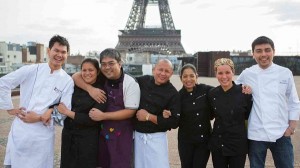
The DA got the chance to do just that when it featured agriculture products and Filipino culinary innovations during the Grand Philippine Exhibition-Archipelago of Exchange at the Musee du Quai Branly, a leading museum for indigenous arts and culture in Paris, France.
Agriculture Undersecretary Bernadette Romulo-Puyat, who headed the DA delegation to France, says that the Filipino cuisine was well received by the French people, as well as the other foreign visitors at the museum. Over 100 of France’s top media practitioners attended the opening in April, where Filipino food that used local produce was the main attraction.
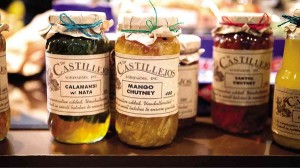
Ten Filipino chefs based in Manila showcased their culinary expertise: Master chef Margarita Fores of Cibo Group and her sous chefs Patricia Ann Locsin, Mariel Bustamante, Jury Cainoy, Gerald Montelibano, Anthony Prudencio and Rey Emil Moraga; and master chef Victoria Pacheco of Chateau 1771 Group and her sous chefs Claudette Cuares and Martin Algarra.
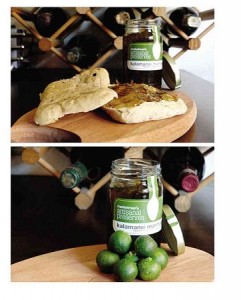
“The Filipino dishes served by our Filipino chefs showed how our fresh fruits, organic products and tuna may be used. The exposition at the Musee du Quai Branly was very good exposure for us,” Romulo-Puyat tells SundayBiz.
For the sit-down luncheon, Chef Margarita Fores prepared appetizers that consisted of salad of muscovado-glazed duck à la mangue, Davao pomelos, Philippine mango, ashen goat cheese log with field greens and rucola. For the soup, she prepared sinigang of langoustine and grouper. Entree consisted of beef tenderloin inihaw with bignay au jus complemented with Philippine-made papaya atsara and nata de coco, organic black and dinorado white rice. For dessert, she featured panna cotta duet topped with dulce de leche and tsokolate; pili nuts and honey with Chevre cheese; and Philippine dried fruits accompanied by Cordillera organic coffee with Natura coco sugar.
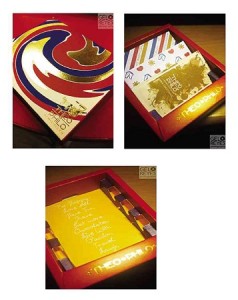
For the cocktail reception, Chef Fores presented the tropical flavors and specialty offerings of the Philippines: Chicharon curls with kangkong mousse and a duet of toppings, lamb adobo flakes, jambon de paris crisp, barquillos cylinders with cheese mousse and fish roe. Then there was the lumpia duet—lumpiang ubod columns, garlic coconut vinegar dipping sauce, lumpia with sotanghon crystal and smoked Dagupan milkfish, Ilokos vinaigrette. A Crostini duet was also served—seafood ragu with capiz bihon guisado, seafood ragu with Almaminos taba ng talangka, chicken adobo rice rolled in broccoli rabe leaves, and taba ng talangka.
Chef Victoria Pacheco, on the other hand, prepared tuna gravlax, seafood brochette, lamb caldereta, fresh smoked spring roll and ox tongue adobo vol-au-vent and saba banana tart.
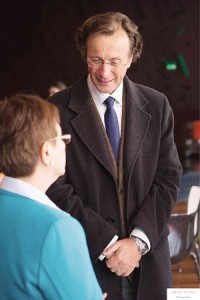
The chefs’ dishes featured both organic and conventional ingredients sourced from the following suppliers: Fresh Start Organic Food Store, Global Organic and Wellness Corp. (Glowcorp), and Sagada Cooperative for the organic black rice, white dinorado rice, heirloom rice, and muscovado sugar; Castillejos Agri-Farms Inc. for the assorted fruit jams; Los Ricos Compania Corp. and The Churner Group for the Coco Natura and Suchero coco sugar; Zubufoods for the Calamansi Marmalade; Echostore Sustainable Lifestyle for the Civet Blend Coffee; Marigold Manufacturing Corp. for the Mama Sita’s assorted food mixes; and Blufin Seafood Corp. and Philfresh Corp. for the octopus, squid, cuttlefish and tuna.
Also flown direct from the Philippines were fresh mangoes, pomelo, smoked fish/tinapa, chicharon, taba ng talangka (crab fat) and the barquillos.
Philippine-made spirits were likewise served by Bleeding Heart Rum Company (Don Papa Rum), Distilleria Limtuaco ( Mango Rum) and VuQo Inc. (Philippine Premium Vodka).
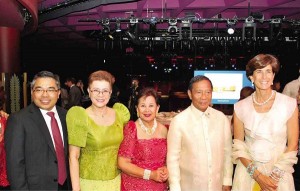
The DA also presented giveaways composed of coco sugar, black/brown sugar, civet/sagada/negrense coffee, calamansi marmalade, mango/calamansi jam and Theo Philo assorted artisan chocolates to all invited guests during the opening and luncheon reception.
Romulo-Puyat admits that it is too early to say if the exhibition in Paris has indeed translated to orders to bring in more agricultural products to Europe. Nevertheless, she is confident that the exhibit has opened the minds of visitors to what the Philippines can offer.
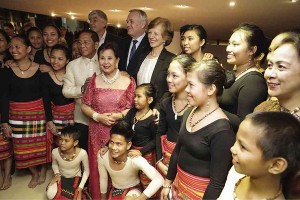
The “Philippines, an Archipelago of Exchange” exhibit, which showcases over 300 works of art that include traditional textiles, pre-colonial gold jewelry, beadwork, baskets, mats, hand-loomed and assembled attire, armor and weaponry, pottery, funerary ware, religious articles, status furniture, and other rare examples of superior handwork, at the Musee du Quai Branly will run until July 14, 2013.
“We were included in the Musee to showcase Filipino food, so that was mainly exposure for us. Organic coco sugar, dried mangoes and tuna are already available in France. I am confident that with more exposure, exports of these products will increase,” says Romulo-Puyat.
She has also expressed confidence that, although the impact of the Musee du Quai Branly exhibit may not be immediate, it will certainly be lasting.
